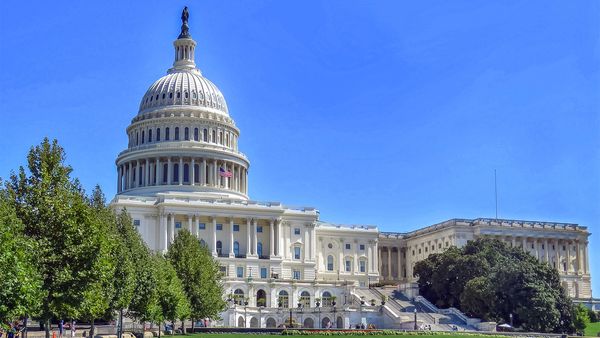
Wall Street investors prefer gridlock in the House and Senate as the U.S. midterm elections are still undecided with a potential run-off in Georgia.
The races in Georgia, Nevada, and Arizona will determine which party controls the Senate and House as there appears to be no obvious winner.
Expect to wait -- the party that controls the House could be announced in several days, while news about the Senate could take as long as a month.
But Wall Street is ready to move on.
"Gridlock is good for the stock market," Thomas Hayes, chairman of Great Hill Capital in New York, told TheStreet. "It will be a net positive when election results are confirmed."
Fed December Meeting Next Concern
Investors are focused on the next moves of the Federal Reserve, which meets again in December. The central bankers are likely to slow down their pace of hikes but raise interest rates again by at least 0.50%.
The Fed could be close to the end of their tightening stance, Hayes said.
"The Fed will no longer have to fight more spending bills and more money being pumped into the economy," he said. "They can reach their terminal rate in the next couple of meetings and market can adjust with more normalized environment."
Once the central bankers stop their rate hikes, businesses can "catch their breath after a one-way street of inflation and rates going for the last 18 months," Hayes said.
Businesses have navigated a tough environment with higher interest rates, inflation and labor costs.
"There looks to be relief in sight," he said.
Stocks Three-Day Rally Ends
The equity markets closed on a positive note on election day, rising for a third consecutive day.
But the uncertainty led the three major stock indexes to dip on Wednesday with the Dow falling as much as 500 points while the tech-heavy Nasdaq took a steeper decline of 2% at one point.
The markets were "caught flat-footed by the results since the expectation was for a Republican wave election that would restrain fiscal spending," Anthony Chan, a former economist at JPMorgan Chase, told TheStreet.
"It would have provided the Federal Reserve with an exit ramp away from aggressive interest hikes and offer some support to equity valuations," he said.
Investors hate uncertainty and the election "disappointed the market's expectations," Chan said.
"The read from markets is not one of panic but rather disappointment that the election failed to provide any concrete clues about the future," he said.
A Democrat leading the White House with a split government has been positive for the stock market in the past because "the general rule is that there are fewer policy changes and less risk to change healthcare and energy and no major tax cuts," Art Hogan, chief market strategist B Riley Financial, told TheStreet.
The downside of a divided government is the potential of the debt ceiling not being raised before a deadline or running into more obstacles getting a budget passed, he said.
"It's annual Kabuki theater on debt ceiling and a potential government shutdown," Hogan said.
The debt ceiling is the limit on the amount of debt the U.S. Treasury can accumulate. There is often showmanship among politicians in raising the ceiling in a timely fashion which results in temporary shutdowns in the federal government.
Inflation Remains a Concern
Investors transferred their focus to Thursday's inflation data, the consumer price index or CPI.
Any sequential declines either from the previous month or year-over-year will be seen as a positive, Hogan said.
"The CPI data is more important and is the news of the week," he said.
Inflation falling in the core CPI data is critical and provides the impetus for the Fed to raise interest rates only by 0.50% in December, Hogan said.
But if inflation rates do not improve in the core CPI which does not include energy and food prices, "that likely tips over the apple cart of the rally - that would be a problem," he said.
The stock market "likes gridlock and it was largely priced in," but has negative consequences for equities, Tim Seymour, founder of Seymour Asset Management in New York, told TheStreet.
“The expected gridlock with a surprise outcome is a net market negative," he said. "It’s a case where you are now moving legislation to regulation and is not an uncommon stage of a presidential cycle. It means more pressure on banks and healthcare."
But the pressure on inflation continues, Seymour said.
"There is upward pressure on interest rates and is not inflation friendly," he said.
The larger issue is that the federal government will have to spend more to finance debt with additional pressure on the lack of affordable housing, Seymour said. The outlook on healthcare costs did not get better - it either stayed the same or got worse.
"The divided government was what the market was more or less expecting," he said.
Higher interest rates "are going to be the story -- there is really nothing that came out that helps because banks are less able to lend and drug companies have to spend more money,” Seymour said.
Equities do not prosper during political gridlock and is a myth, Robert Johnson, a professor at the Heider College of Business, Creighton University, told TheStreet.
But fixed-income assets do prosper during gridlocks and large companies exhibit higher returns than small companies, he said.
"Politicians get too much credit for economic prosperity or blame for poor economic performance," Johnson said. "From an investment portfolio standpoint, investors should spend less time concerning themselves with political developments and more time monitoring Federal Reserve monetary policy during a gridlock."







